
Beginning with the dark, ominous music of the prelude of Charles Wuorinen and Annie Proulx’s opera Brokeback Mountain, we know we are in for a very different and far less sentimental version of the work than was had with Ang Lee’s iconic 2005 film. This 2014 Teatro Real Madrid production (dedicated to the late Gerard Mortier), with sensitive and incisive stage direction by Ivo van Hove, has been released on DVD
by Bel Air Classiques.
This opera brings about a third major character to go with the expected herders Jack Twist and Ennis Del Mar: the mountain itself. It is a mysterious and forbidding place. We learn in the first scene that the Boss Aguirre is worried that his expected workers are late or not coming because they’ve “heard something about the mountain.” He describes the mountain as “a knife blade rising from the earth”, a place of “dark power” and “an evil place that kills men.”
Shortly after the two cowboys agree to take the job, they share a beer at a bar, where the bartender warns them “It’s a bad mountain”, and recommends they take plenty of whiskey up with them because “I seen crazy men come down”, and then, hauntingly, repeats “isolation…isolation.” The omnipresent mountain is given a splendid video projection by Tal Yarden, bleak and unwelcoming.
Wuorinen’s modernist music is generally quite effective, especially at creating a constant atmosphere of tension. Some passages feel overly busy, even noisy, with ominous low notes masked by too much plinky piano. Still, the few soaring lyrical passages are lush and moving, particularly Ennis’ “We are like hawks, Jack” early in their time on the mountain, and his heart-wrenching final farewell to Jack at the end.
And there is a haunting quality to the music that is almost hypnotic, reminiscent of Berg. Conductor Titus Engel maintains a detailed, exciting pace that never sags. I found Proulx’s libretto consistently excellent, ripe with moving imagery and very effective in establishing the characters of the terse-speaking Ennis and the more friendly, personable Jack.
Baritone Daniel Okulitch as Ennis and tenor Tom Randle as Jack offer some of the finest operatic acting in recent memory with committed, detailed, powerful performances. Okulitch only begins singing when on the mountain, speaking only in short, terse phrases with his hat obscuring his face in the first scenes. He sings with a pure, passionate tone throughout, resorting again to spoken words in his moments of anger. Randle navigates some of the most difficult music in the score with beauty and verve. His is an achingly vulnerable performance.
The chemistry between these two singing actors is palpable, most clearly in the moving scene of the morning after their first night of passion. The deeply torn Ennis movingly repeats “He calms me” when describing his attraction to Jack, then immediately and furiously sings “It can’t happen again… I’m marrying Alma.” Jack longingly sings “He might be the someone for me”. Proulx’s excellent choice of having both men singing their separate thoughts and Wuorinen’s musical choices make this scene a highlight.
Heather Buck plays Ennis’ wife Alma with girlish intensity. In a scene that doesn’t appear in the film, we get to see Alma shopping for wedding dresses with her mother. Alma’s demand that she only wants the most expensive dress adds a note of selfishness to her portrayal.
Veteran Jane Henschel has a very effective cameo as Jack’s mother, sensitive and understanding, in contrast to Jack’s bitter, complaining father, played by Ryan MacPherson. The chorus of Teatro Real appears in only one scene, when Ennis learns that Jack has died. The chorus clearly represents the disapproval of society for even the suspicion of homosexuality as they question Ennis’ emotional reaction. The chorus sings with precision.
A very effective set and moody lighting by Jan Versweyveld allow the action to move smoothly from scene to scene. Never does the pace or momentum of the story flag while we wait for a scene change.
Many have had mixed reactions to this opera, especially about Wuorinen’s clearly modernist, frequently dissonant score. I find this work to be a major achievement, and I agree with Proulx that the opera tells the story more clearly than the film. The performances of Okulitch and Randle certainly elevate the work with their near-ideal casting. Once I began watching this well-produced DVD (though I long for more information in the accompanying brief booklet) I couldn’t stop until it ended, with the haunting image of Jack’s shirt floating toward the heavens as Ennis sings his last farewell. I certainly think this opera should have many productions to come.














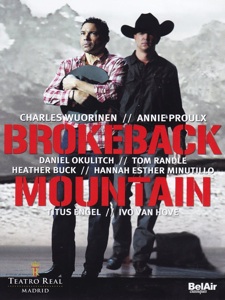
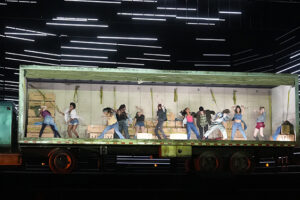
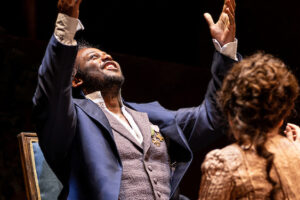
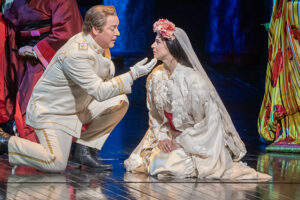
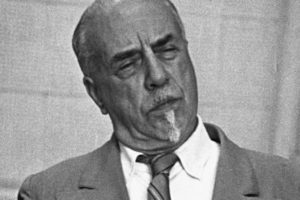





Comments